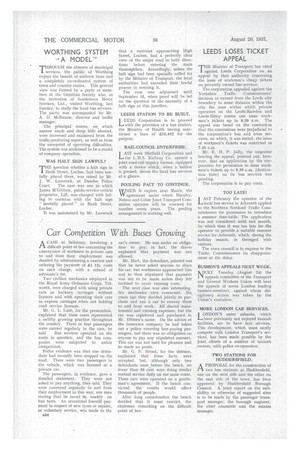Car. Competition With Buses Growing A CASE at Salisbury, involving
Page 54

If you've noticed an error in this article please click here to report it so we can fix it.
a difficult point of law concerning the conveyance of workmen in private cars to and from their employment was decided by administering a caution and ordering the payment. of LI 12s; costs on each charge, with a refusalof advocate's fee.
Two civilian mechanics employed in the Royal Army Ordnance Corps, Tidworth, were charged with using private cars as hackney carriages without licerices and with operating their cars as express carriages when not holding road service licences.
Mr. G. L. Lush, for the prosecution, exp/ained that these cases represented a swiftly growing practice throughout the country. Three or four passengers werecarried regularly in the cars, he said. Bus services operated on the route in question, and the bus companies were subjected to unfair competition.
Police evidence was that one defendant had recently been stopped on the road. There were two passengers in the vehicle, which was licensed as a private car.
The passengers, in evidence, gave a detailed statement. They were not asked to pay anything, they said. They were conveyed regularly to and from their employment in this way, one man stating that he saved 9s. weekly on bus fares. An occasional freewill payment in respect of new tyres or repairs, or voluntary service, was made to the B44 • car's owner. He was under no obligation to pay; in fact, the driver explained that payment was not allowed.
Mr. Hart, the defendant, pointed out that he never asked anyone to share his car, but workmates approached him and he then stipulated that payment was not to be made unless they felt inclined to cover running costs, The next case was also interesting. Six mechanics were concerned. Six years ago they decided jointly to purchase and run a car to convey them to and from work. All shared maintenance' and running expenses, but the car was registered and purchased in Mr. Dibben's name, On the advice of the insurance company he had taken out a policy covering fare-paying passengers, but there was no obligation on anyone to pay any stipulated amount. This car was not used for pleasure and he made no profit.
Mr. G. F'. Broad, for the defence, explained that these facts were accepted, but, although only two defendants were _before the bench, no fewer than 50 cars were doing similar mutual service daily on the same route. These cars were operated on a gentleman's agreenient. If the bench eonvkted, the results would affect thousands of people.
After long consideration the bench decided that it must convict, the chairman remarking on the difficult point of law,




















































































